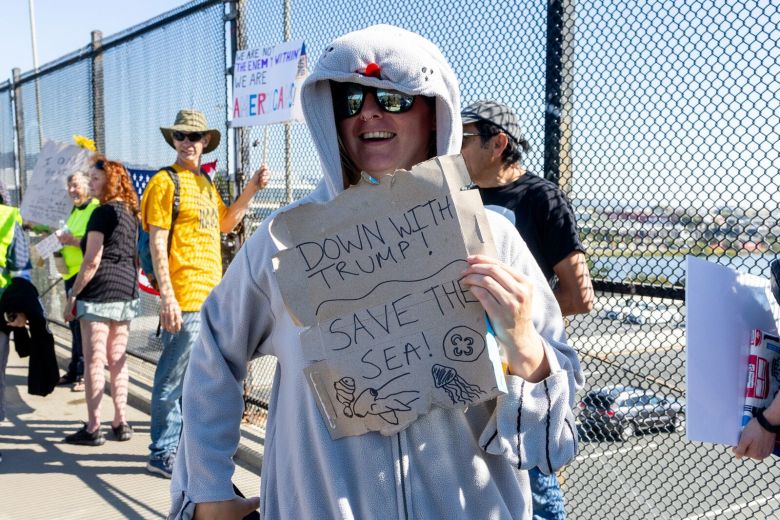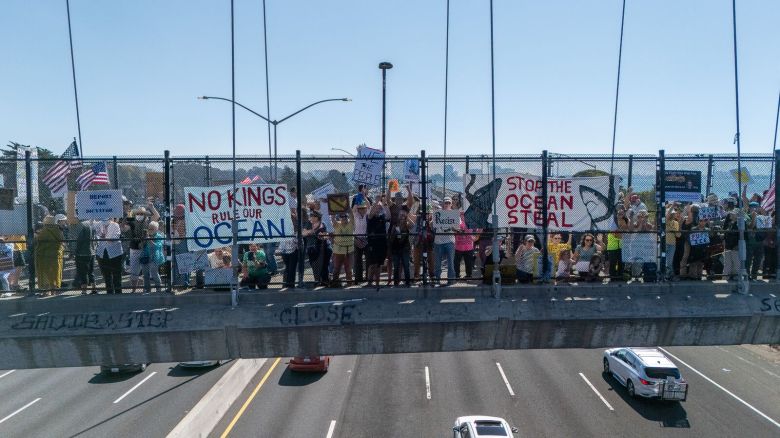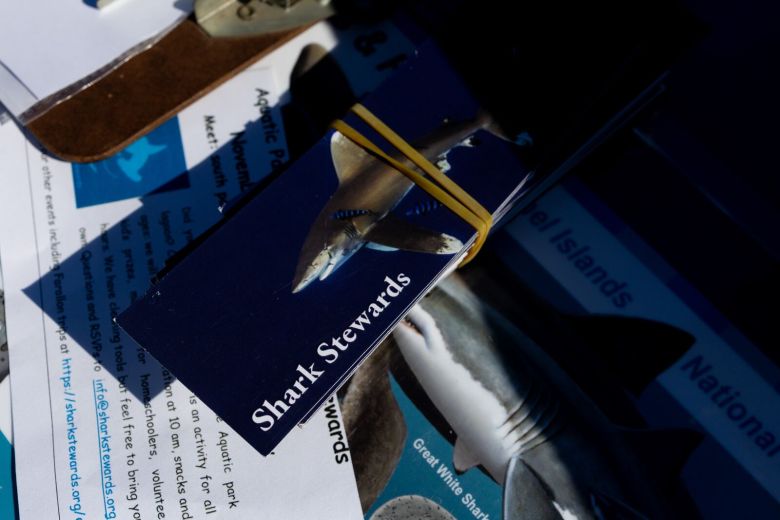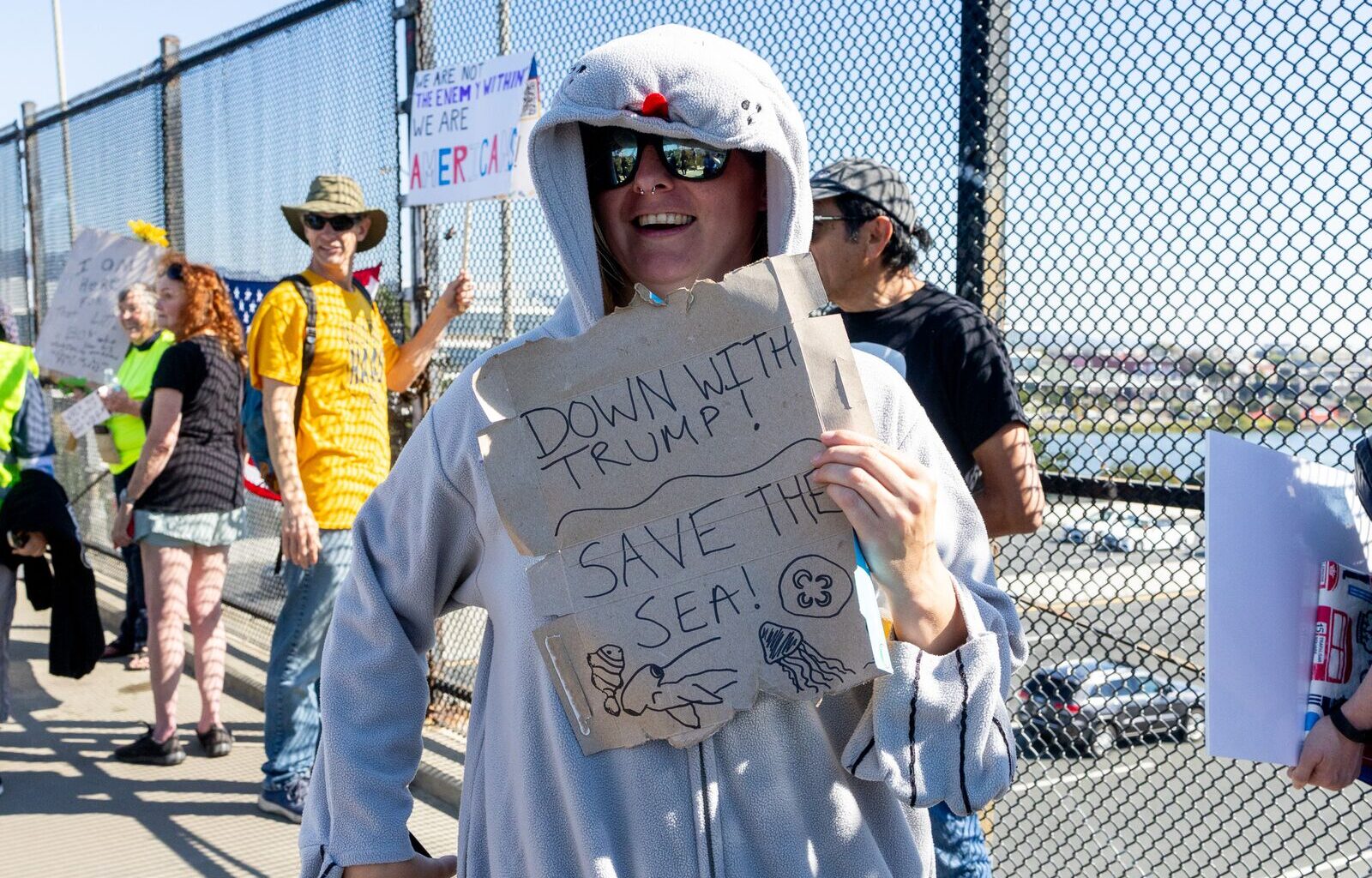 A Shark Stewards protester at the “No Kings” rally on the I-80 overpass Saturday, Oct. 18. Credit: Sara Martin for Berkeleyside
A Shark Stewards protester at the “No Kings” rally on the I-80 overpass Saturday, Oct. 18. Credit: Sara Martin for Berkeleyside
In the throng of “No Kings” protesters at Aquatic Park in Berkeley last Saturday, one group stood out. Dressed like Jaws and wearing stickers with shark symbols, people with the nonprofit Shark Stewards came out in opposition to an executive order allowing commercial fishing in areas now protected as marine national monuments.
“If it happens, some species of sharks will disappear within the next five years,” said Karina Nikulina, a Shark Stewards board member. “I’m not very political, but I am pro-nature. And it doesn’t make any sense to me, what he’s doing.”
Based in Berkeley and founded in 2006, Shark Stewards works to protect sharks and their habitats globally, including in the San Francisco Bay, home to plenty of shark species, including the leopard shark, soupfin shark and even the occasional great white shark.
More than 800 people showed up at the No Kings rally organized by Shark Stewards, said director David McGuire, with more than a few dressed as sharks or other marine creatures. Connected to the nonprofit Earth Island Institute, Shark Stewards focuses on protecting endangered sharks and rays from overfishing and shark finning, as well as establishing marine protected areas. Advocating for a healthy and biodiverse ocean ecosystem, it supports the 30-by-30 initiative to protect at least 30% of the ocean by 2030.
 David McGuire, director of Shark Stewards poses for a photo with protester Katya Koriabine at the “No Kings” rally. Credit: Sara Martin for Berkeleyside
David McGuire, director of Shark Stewards poses for a photo with protester Katya Koriabine at the “No Kings” rally. Credit: Sara Martin for Berkeleyside
Sharks may be scary to some, but McGuire considers them symbols of ocean health. He calls them regulators, sanitarians and surgeons, because they help clean up ocean garbage and keep prey populations healthy.
“We should not be afraid of sharks,” McGuire said. “We should be afraid when they are not around.”
Over 300 shark and ray species are vulnerable, endangered or critically endangered due to overfishing and shark finning, the practice of removing shark fins for traditional Chinese medicine and soup. Overfishing occurs when sharks are caught inadvertently as bycatch in tuna and swordfish fisheries.
“Shark finning is heinous, cruel and wasteful, driven by greed and status,” McGuire said. “The practice is largely driven by the increase in wealth in China post communism. The demand for this luxury, shark fin soup, far exceeds the supply of sharks in the sea.”
 Ren Hampton, a Shark Stewards protester, shows off their fresh hammerhead shark tattoo. Credit: Sara Martin for Berkeleyside
Ren Hampton, a Shark Stewards protester, shows off their fresh hammerhead shark tattoo. Credit: Sara Martin for Berkeleyside
In 2022, Shark Stewards documented a mass shark and ray die-off in the Aquatic Park lagoon. Now McGuire monitors lagoon life by testing water quality and paddling a standup board, in search of dead sharks and rays. The group also does a monthly park cleanup, engaging youth and community members.
The group opposes a bill in the U.S. Senate that would establish a task force to examine shark attacks on humans, something Shark Stewards sees as “a thinly veiled approach to open fishing on protected species” that would greenlight sportfishing for sharks.
Saturday’s protest was focused more on protecting marine national monuments, one of which the Trump administration opened up to commercial fishing with an executive order in April, putting endangered shark species at an even greater risk.
“The people should have a right to vote or a right to say if we want to see the gray whales go extinct, or if we hate sea otters and want them to have oil all over their coats,” McGuire said. “Then we should be able to vote that in, not the president.”
Shark Stewards set up tables with shark stickers, water jugs and petitions, ready to discuss their work with passersby. Some protesters stopped for photos with a Shark Steward dressed in an inflatable yellow shark costume and another in a gray shark onesie.
“We have kids, we have parents, we have the elderly, we have the young, we have music, we have musicians and we have people protesting every single different cause that they care about,” Ren Hampton, a protester with Shark Stewards, said at the No Kings rally. “It’s just so beautiful. I really hope that out of this, people can start realizing that everyone around us is our neighbors and humanity is actually a lot better than it feels like.”
 The I-80 overpass was filled with hundreds of demonstrators Saturday afternoon, many sporting signs supportive of Shark Stewards. Credit: Jonathan Hidalgo for Berkeleyside
The I-80 overpass was filled with hundreds of demonstrators Saturday afternoon, many sporting signs supportive of Shark Stewards. Credit: Jonathan Hidalgo for Berkeleyside
The group was trying to bring awareness to Trump’s executive order opening commercial fishing in the Pacific Remote Islands Marine National Monument. The practice has not been allowed since 2009, when President George W. Bush established the areas as a monument days before leaving office. The area is known to have exceptional biodiversity and is home to endangered sea turtles, marine mammals, coral reefs, whales and sharks, among other marine life.
Activists fear commercial fishing will spread to other marine national monuments, such as the Papahānaumokuākea Marine National Monument near Hawaii. The spot is one of the world’s largest protected areas, totaling more than half a million square miles. Its diverse and largely pristine ecosystem has cultural significance to native Hawaiians, and houses one of the largest, most intact and healthy coral reefs in the world.
 Pamphlets from the Shark Stewards table at the “No Kings” protest. Credit: Sara Martin for Berkleyside
Pamphlets from the Shark Stewards table at the “No Kings” protest. Credit: Sara Martin for Berkleyside
The reefs in the Papahānaumokuākea monument are home to many vulnerable species, McGuire said. “The critically endangered monk seal, green sea turtles are recovering there, tiger sharks and other species, as well as marine mammals like whales.”
Environmental groups, including Earth Justice, an environmental law organization, sued the Trump administration to prevent commercial fishing access within the limits of the Pacific Remote Islands Marine National Monument. They argued that the order was “exceeding the president’s constitutional authority and infringing upon the powers reserved to Congress.” In August, the federal district court in Honolulu ruled that commercial fishing cannot legally continue in the Pacific Remote Islands.
This story is part of “The Stakes,” a UC Berkeley Journalism project on executive orders and actions affecting Californians and their communities.
We know that most readers don’t get to the end of the article. But you did! To support our in-depth, rock-solid reporting, please consider making a donation to our nonprofit newsroom today. We rely on our readers — particularly the ones who read the whole story!
“*” indicates required fields

